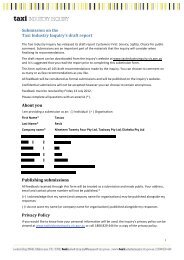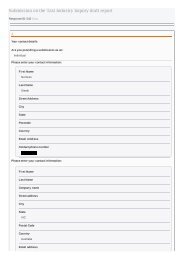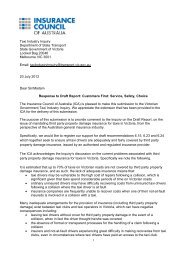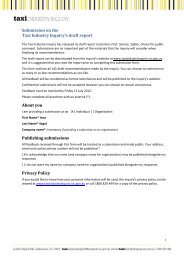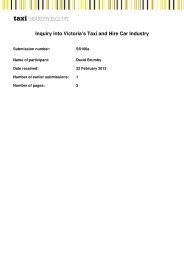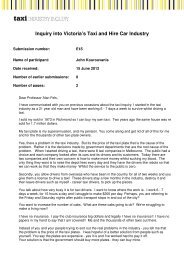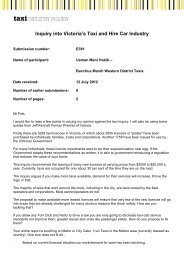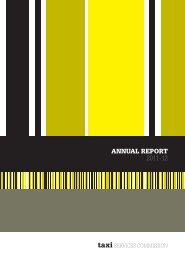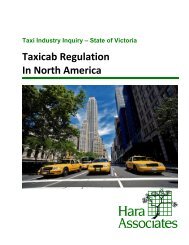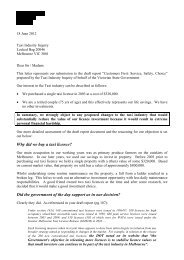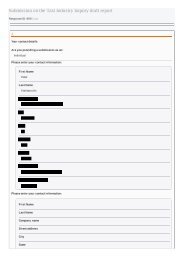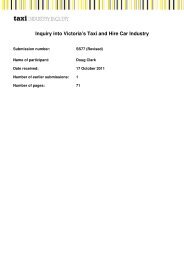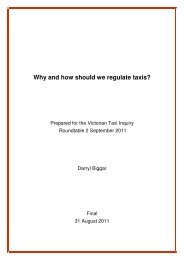Part D â Understanding and improving industry performance (PDF ...
Part D â Understanding and improving industry performance (PDF ...
Part D â Understanding and improving industry performance (PDF ...
You also want an ePaper? Increase the reach of your titles
YUMPU automatically turns print PDFs into web optimized ePapers that Google loves.
While some respondents call for the assignment of<br />
licences to be prohibited outright, others see merit in<br />
capping future assignment fees. In its submission, the<br />
ESC argues that an assignment fee cap “would limit the<br />
economic profits being transferred to licence holders”<br />
<strong>and</strong> “be a means to positively affect the distribution<br />
of income between <strong>industry</strong> participants”. 54 The VTA<br />
notes that “placing a cap on assignment fees will control<br />
excessive <strong>and</strong> beyond the usual dem<strong>and</strong>s by licence<br />
holders”, 55 while a joint submission from Ambassador<br />
Taxis, TaxiLink <strong>and</strong> Cabways argues that capping<br />
assignment fees “will automatically bring a correction to<br />
the prices being paid for assignable licences”. 56<br />
Some licence holders point out that they have made<br />
business <strong>and</strong> investment decisions based on an<br />
expectation that licences will remain tradeable <strong>and</strong><br />
assignable, <strong>and</strong> will continue to have a ‘reasonable<br />
scarcity value’ through government regulation of the<br />
number of licences issued.<br />
10.3.2. The effect of assignments <strong>and</strong><br />
transfers on market <strong>performance</strong><br />
In discussing licence assignment <strong>and</strong> transfer, it is helpful<br />
to underst<strong>and</strong> some of the history to the introduction <strong>and</strong><br />
development of these policies.<br />
Licence transfers have been allowed since some time<br />
in the early 1970s. The widespread use of assignments<br />
began after the Foletta inquiry, in the late 1980s. Prior to<br />
this time, assignments were only allowed under relatively<br />
strict criteria. By 1989, 239 licence assignments had<br />
been approved. By 2001 this had reached 1,287 for the<br />
metropolitan fleet. 57 In 2011, this number reached 2,155<br />
or nearly 70 per cent of assignable licences. 58<br />
These effects seem to be reflected in licence value<br />
data. Table 10.3 summarises licence price changes in<br />
metropolitan Melbourne from 1975 to 2011 in both nominal<br />
<strong>and</strong> real (inflation adjusted) terms. Growth in real licence<br />
values appeared to accelerate after the Foletta review was<br />
completed <strong>and</strong> assignments became more widespread.<br />
Table 10.3 Licence value changes, 1975 to 2011<br />
Period<br />
Annual growth<br />
in licence value<br />
(nominal)<br />
1975 – 1985 12.7% 2.9%<br />
1985 – 1995 12.2% 6.6%<br />
1986 – 2011 9.1% 5.6%<br />
Sources: Foletta (1986), KPMG (1999), VTD data<br />
Annual growth<br />
in licence value<br />
(real)<br />
Many have pointed to the introduction of assignments<br />
as the start of many of the <strong>industry</strong>’s observed problems<br />
with ‘investors’, summed up by one submission:<br />
What is the purpose of a taxi licence? It used to be<br />
to operate a taxi-cab <strong>and</strong> provide a personalised<br />
door to door service for the travelling public. Then<br />
licence assignment was introduced, during a period<br />
of government insanity, <strong>and</strong> is now the most common<br />
operating structure…The ability to assign your licence<br />
goes back about twenty years when after much<br />
agitation <strong>and</strong> lobbying from long term licence owners,<br />
the government of the day allowed owners to lease or<br />
assign their licence to another party. Allow them to<br />
use their licence as a form of superannuation if you<br />
like. With one fell swoop of the legislator’s pen they<br />
not only added another [item] to an already long list<br />
of expenses, but put in place the largest single<br />
expense item… 59<br />
However, the Foletta inquiry noted that the <strong>industry</strong><br />
already had a number of existing problems in 1986. In<br />
particular, poor driver remuneration, high licence values<br />
<strong>and</strong> an insufficient number of taxis to meet peak dem<strong>and</strong><br />
were all evident at the time of the inquiry. The assignment<br />
of licences from the late 1980s could not have caused<br />
any of these problems, although, arguably, it could have<br />
accentuated them.<br />
54 ESC Submission, Op. Cit., p.VII <strong>and</strong> p.34<br />
55 VTA, Submission to the Taxi Industry Inquiry, SS60C, p.1<br />
56 Ambassador Taxis, TaxiLink <strong>and</strong> Cabways, Op. Cit., p.30<br />
57 McQuillen, Rob (2001), Op. Cit., p.12<br />
58 Inquiry calculation based on VTD data. Note that not all metropolitan<br />
licences are assignable<br />
59 Holger Hansen, Op. Cit., p.1<br />
200



